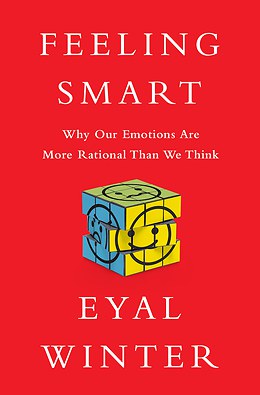Feeling Smart
Douban
Why Our Emotions Are More Rational Than We Think
Eyal Winter
Übersicht
Which is smarter—your head or your gut? It’s a familiar refrain: you’re getting too emotional. Try and think rationally. But is it always good advice?
In this surprising book, Eyal Winter asks a simple question: why do we have emotions? If they lead to such bad decisions, why hasn’t evolution long since made emotions irrelevant? The answer is that, even though they may not behave in a purely logical manner, our emotions frequently lead us to better, safer, more optimal outcomes.
In fact, as Winter discovers, there is often logic in emotion, and emotion in logic. For instance, many mutually beneficial commitments—such as marriage, or being a member of a team—are only possible when underscored by emotion rather than deliberate thought. The difference between pleasurable music and bad noise is mathematically precise; yet it is also something we feel at an instinctive level. And even though people are usually overconfident—how can we all be above average?—we often benefit from our arrogance.
Feeling Smart brings together game theory, evolution, and behavioral science to produce a surprising and very persuasive defense of how we think, even when we don’t.
contents
Preface p. ix
Introduction: What Is Rationality? p. xv
Part I On Anger and Commitment
Chapter 1 What Is the Point of Getting Annoyed? Emotions as a Mechanism for Creating Commitments p. 3
Chapter 2 Why We Love Those Who Are Cruel to Us: Stockholm Syndrome and the Story of the Nazi Schoolteacher p. 12
Chapter 3 Emotional Impostors, Empathy, and Uncle Ezra's Poker Face p. 18
Chapter 4 Game Theory, Emotions, and the Golden Rule of Ethics p. 31
Chapter 5 The Prisoner's Dilemma in Repeated Interactions: Do Drawn Knives Increase Cooperation in the World? p. 38
Chapter 6 On Decency, Insult, and Revenge: Why Don't Suckers Suffer from Disgust? p. 51
Part II On Trust and Generosity
Chapter 7 On Stigmas and Games of Trust: Why Did the Bees Commit Suicide? p. 61
Chapter 8 Self-Fulfilling Mistrust p. 69
Chapter 9 Cultural Differences, Palestinian Generosity, and Ruth's Mysterious Disappearance p. 73
Chapter 10 Collective Emotions and Uncle Walter's Trauma p. 87
Chapter 11 The Handicap Principle, the Ten Commandments, and Other Mechanisms for Ensuring Collective Survival p. 98
Chapter 12 Knowing How to Give, Knowing How to Receive: The Full Half of the Cholent p. 110
Part III On Love and Sexuality
Chapter 13 The Spray That Will Give Us Love: On the Hormone that Creates Trust and Neutralizes Suspicion p. 117
Chapter 14 On Men, Women, and Evolution: Testing the Myths p. 121
Chapter 15 Make Me a Match Made in Heaven: Reproduction and the Mathematics of Romance p. 145
Chapter 16 From Cavemen Flutes to Bach Fugues: Why Did Evolution Create Art? p. 160
Part IV On Optimism, Pessimism, and Group Behavior
Chapter 17 Why Are We So Negative? The Arithmetic of Emotions p. 167
Chapter 18 On Arrogance and Humility: The Norwegian Professor's Syndrome p. 173
Chapter 19 Overconfidence and Risk: The "It Can't Happen to Me" Syndrome p. 178
Chapter 20 The Voice Is Herd: On the Sources of Herd Behavior p. 189
Chapter 21 Team Spirit: The Paradox of the Generous Bonuses and the Lazy Workers p. 201
Part V On Rationality, Emotions, and Genes
Chapter 22 Irrational Emotions p. 219
Chapter 23 Nature or Nurture: What Is the Source of Rational Emotions? p. 228
Epilogue p. 233
Notes p. 239
Index p. 247
